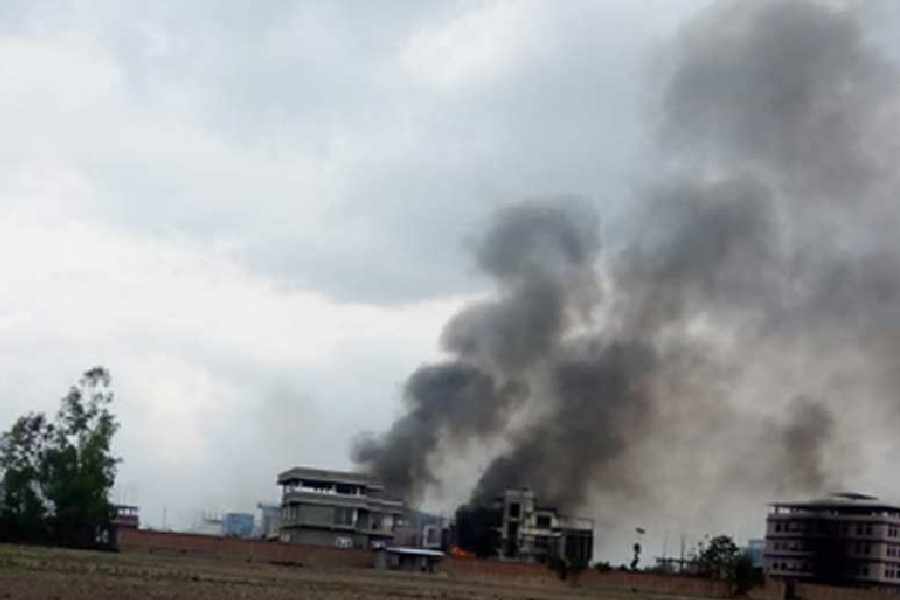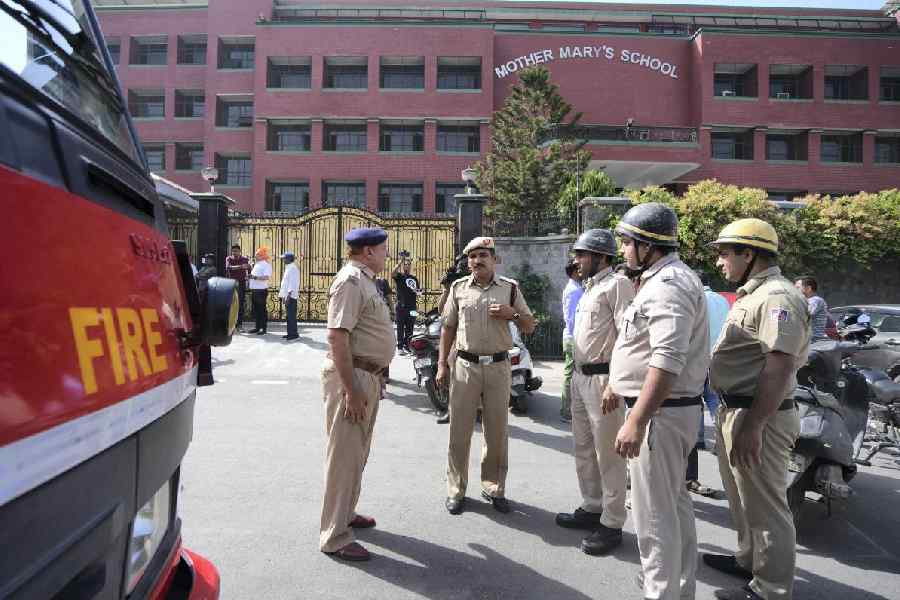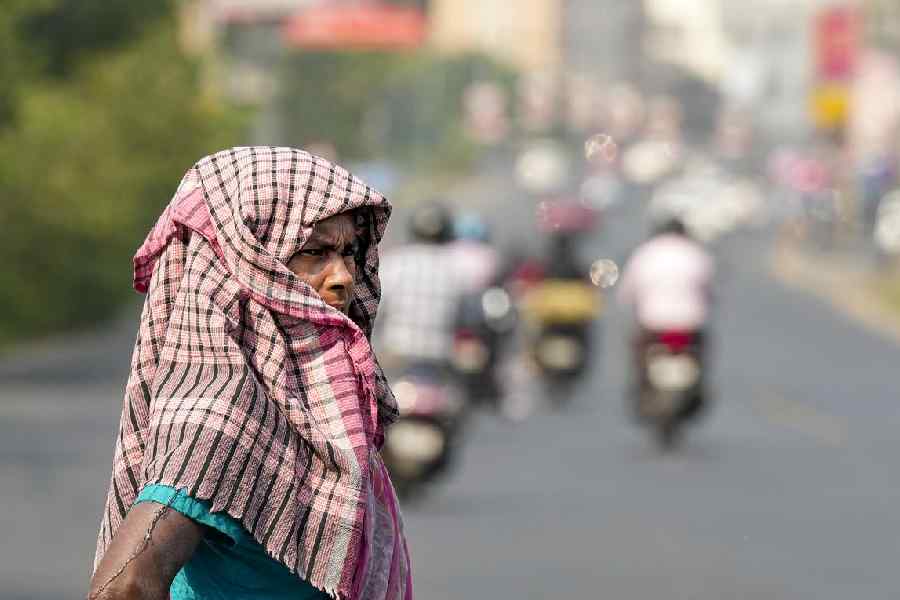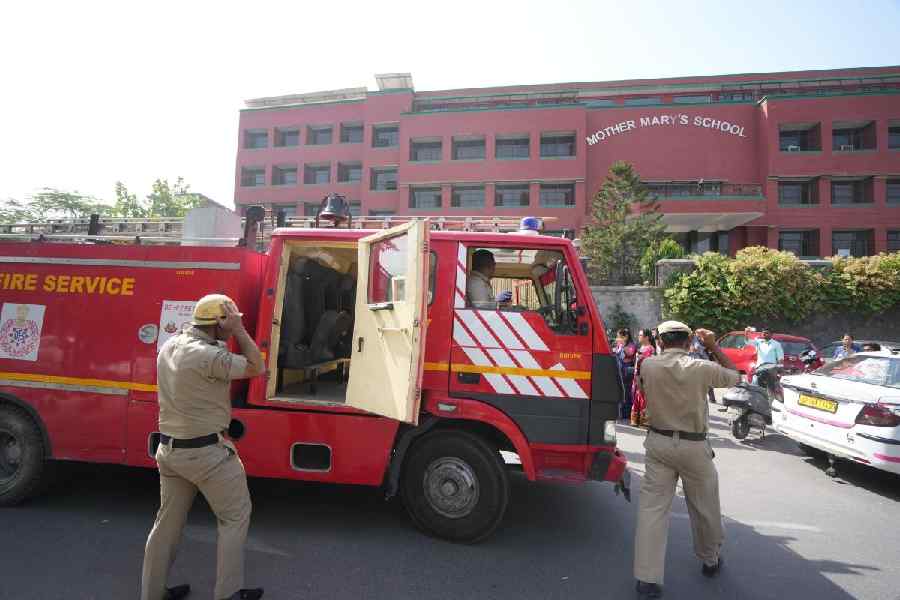Thangi Hmar (62), a retired senior health supervisor with the Manipur government, continues to writhe in pain from the injuries she suffered on her chest and limbs in the outskirts of Imphal on May 3.
The respiratory distress she continues to endure, even after getting discharged from a private hospital in Calcutta, is admittedly the least of her traumas.
The reality of losing her three-storey house which was burnt to tinder right before her eyes, every bit of her possession and valuables destroyed or looted and even the last remnant of her identity and property papers snatched away mean little for the senior citizen compared to the shock and disbelief at the savagery perpetrated mostly by people she knew as neighbours all her life.
Thangi was among the first lot of Manipuri tribals who managed to escape the mindless violence, which had its epicenter in Churachandpur and rocked the state from the evening of May 2. She landed in Calcutta on the afternoon of May 4 with her son, daughter and three grandchildren with nothing more than an airline ticket in hand and the bruises on her body and mind.
From the airport Thangi was taken directly to a hospital in Salt Lake from where she was discharged three days later. Staring at an endless uncertainty, the family has currently taken shelter with its relatives in Rajarhat from where it plans to move out soon.
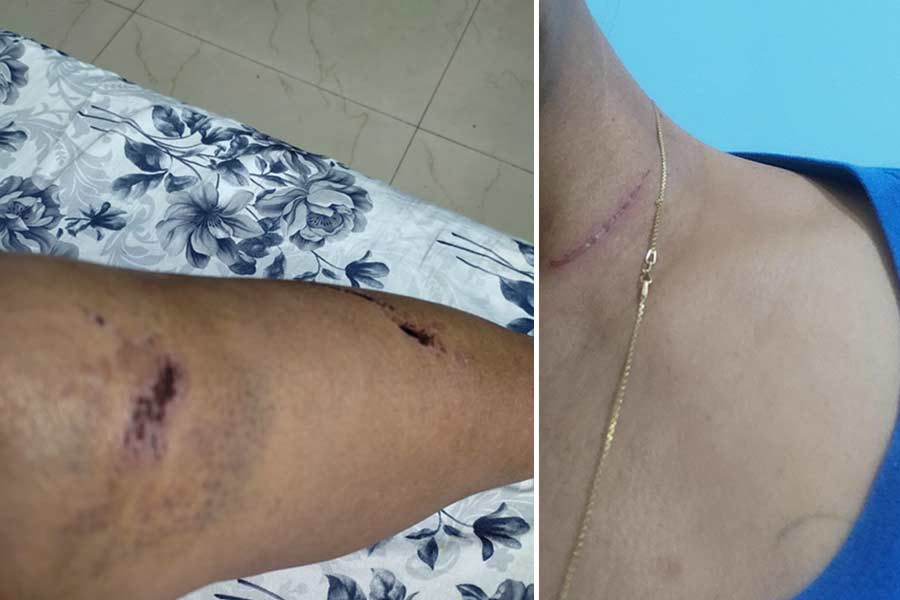
Sixtytwo-year-old Thangi Hmar's injuries
The Hmar family story
Thangi and her family are Hmar members which is among the minor Christian tribes of the 35-odd tribal communities of the Manipur hills that’s mostly dominated by the Kukis and who have allegedly been at the receiving end of Hindu-dominated Meitei attacks. Unofficial reports state more than 50 people have been killed and over 50,000 rendered homeless since the violence broke out. It is estimated that a little over a thousand Hmar people currently live in Imphal and its surroundings.
“We were receiving information of wanton violence taking place in the Langol area of Imphal West from the night of May 3. The rioters were taking one locality after another burning and looting houses, churches and community halls. We were also receiving news of people being lynched and hacked. Soon the rioters had reached the neighbouring Sangaiprov and New Lambulane areas. We were worried stiff,” said 38-year old F Kimi, Thangi’s daughter and a mother of three.
“Early next morning I locked my home and, along with my children and our two pet dogs, went over to my mother’s house which stood right across the road. We lived close to the airport and knew that our area was next in line. Thick black smoke which bellowed from houses on fire filled the skyline. We frantically called the paramilitary forces, but despite their assurances no help came. The mob had blocked roads with burning tyres. Around 12 noon, the mob reached our locality,” Kimi recounted, fear writ large on her face.
Children locked in bathroom
“As many as 22 people from four neighbouring households had taken shelter at my mother’s house that morning. The group included six Mizos, two of whom were very sick. We had locked up the children in the bathroom. Soon the mob was banging our iron gate and throwing stones on our windows. They demanded that we come out and threatened to burn us alive inside the house if we didn’t,” she went on.
“The mob had a unique way of announcing their arrival. They would keep banging on electrical posts with metallic objects. That was the signal for all Meiteis of the locality to come out of their homes and get over to their side. For us, tribals, it was a signal to find the safest corner and hide,” Kimi described.
Sasang, Kimi’s brother who is in the construction business, chipped in: “I was watching this from the first floor balcony of the house. We knew the threats were serious so we came out all together all the while begging the mob to spare us. There were more than a 100 people in front of the gate. Initially they took away our phones and whatever little belongings we could carry with us including our purses and some valuables and said they wouldn’t harm us. We had barely crossed the road and reached the adjacent field when I realized that my mother was missing.”
'Crowd behaving like lunatics'
“I ran back and was horrified to find they were mercilessly beating her up with blows and sticks. My pleas fell on deaf ears and I hugged her in my effort to try and shield her body with mine. But the crowd was behaving like lunatics and soon the blows were landing on me. They shoved me in a drain and continued with their assault. We would have surely died that day had some local Meitei women not stopped them and helped us escape,” Sasang narrated and showed the injury marks on his head and shoulders.
“I had to protect my children and helplessly watched the crowd set fire to our houses after thoroughly looting our belongings. I had packed two small suitcases of our most essential documents like our identity cards and property papers. I saw someone stealing them away in that commotion. But at that point, I couldn’t care less. My dogs were still inside the house when they torched it. I couldn’t save them. They were burnt alive,” Kimi narrated, struggling to hold back her tears.
The family managed to reach Imphal airport on foot, primarily with an intention to find shelter. A relative staying outside the state, however, bought them air tickets with the help of a government official at the airport known to the family, and persuaded them to leave.
“From the aircraft window I could see our houses up in flames along with most other houses in the neighborhood,” Kimi’s eyes looked blank.
Clothes were blood-soaked
“When we reached Calcutta in our chappals, our clothes were torn and blood- soaked. For the next few days I couldn’t arrange a change since we were in hospital for my mother,” Sasang said, forcing a wry smile.
Kimi, though, considers herself and her family “very lucky” to have made it out alive. “There are thousands of others like us who are still stuck in the middle of the ongoing brutality or are suffering in relief camps,” she said.
But it isn’t just the violence faced by the family that has caused distraught. The role of the state government is also what the victims point fingers at.
“The initial response of the state government was slack. The government gave the rioters a free hand for the first few days of violence. We reached out to police and even army personnel who said they could do nothing since their hands were tied,” Kimi complained.
Police alerted, but they came late
“Police were alerted even before the churches were attacked. But by the time help came, they were already burnt to ashes and the rioters had left the spot,” she lashed out.
“When we were at the airport we saw a large number of RAF and army personnel brought in from elsewhere. But they had no orders to march into the city where all the action was taking place,” Sasang declared.
The strife, the family believes, is far from having ended. “They don’t want the tribals in their hospitals, in their offices, on their land and in their valley. This will inevitably give rise to call for separate hill administration or even separate statehood,” Kimi maintained.
“They have stripped me of my dignity. They have destroyed my future. They have robbed my trust in the Meiteis and in the government. Today I have nothing to lose but my family,” Sasang added and stated that he would refuse the compensation offered by the N Biren Singh government.
But for sexagenarian Thangi who is swinging between anger and disbelief on account of the horrors she experienced despite serving the government all her life, it's her faith in God that she said would keep her going.
“One day I will go back and fight for my land, my property and everything else I have lost,” she declared, sounding resolute.

